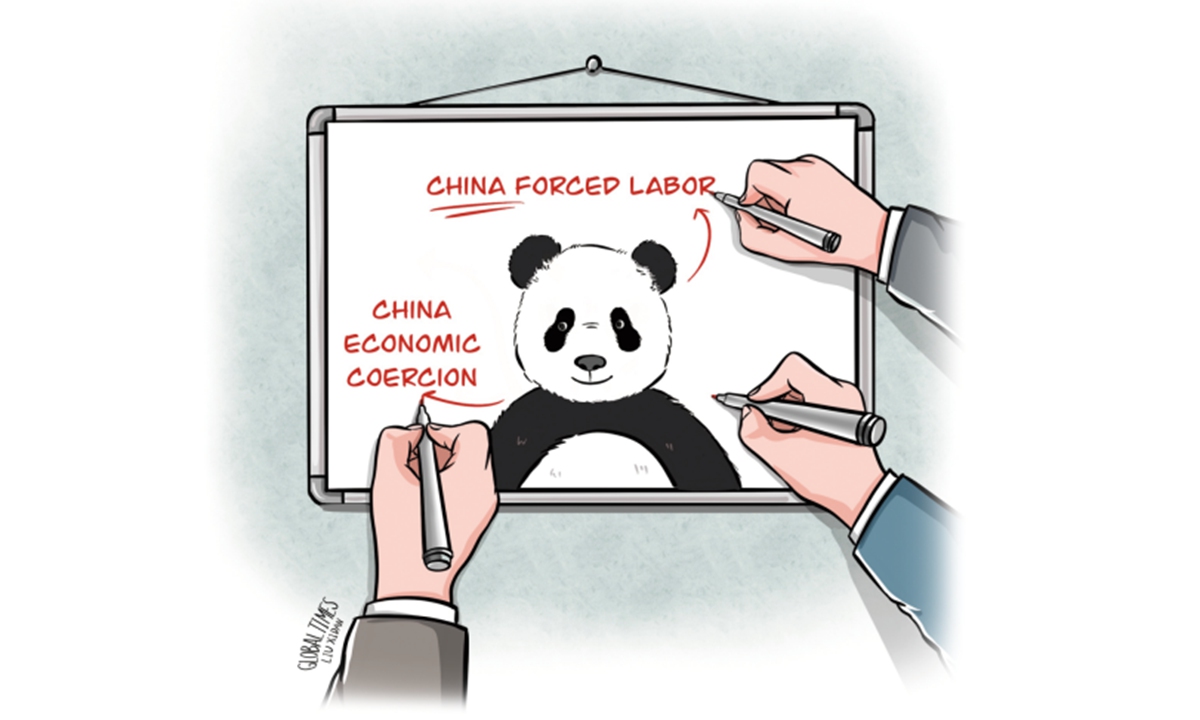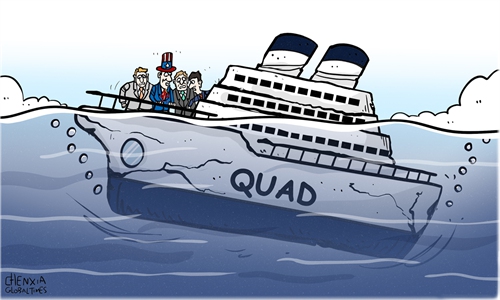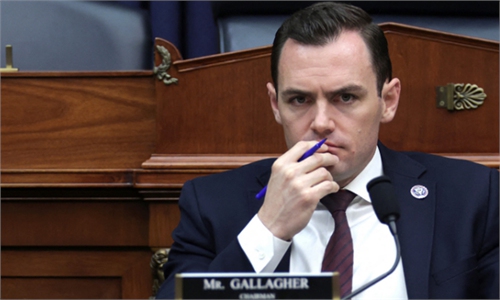
Illustration: Liu Xidan/GT
What if the G7 suggesting that China is using coercive economic policies to threaten smaller countries was wrong?
Uninformed people immediately raise the now much-debunked issue of Sri Lanka's port, but even the BBC didn't mention that, they mentioned sanctions on Australia. But, according to Australia's Department of Foreign Affairs and Trade, in 2021 almost one-third of Australia's trade came from or went to China, and in 2022, according to media reports, that increased to between 35 and 40 percent. That's hardly coercive.
In 2022, China exported $3.59 trillion in total but only $80 billion went to Australia. Economically, if they wanted to, China could squash Australia like a bug, that would be coercive, but China has never wanted to, and nor have they ever threatened to do that.
Lithuania gets a mention too, with the fact that China won't deal with it anymore. Of course it won't, because Lithuania has gone against UN resolution 2758 and effectively recognized a province of China as a "country." Why would China recognize or trade with a country that doesn't recognize China?
The EU, around the same time, stopped negotiations with China on ratifying the Comprehensive Agreement on Investment, something that could easily be interpreted as economic coercion. The US has sanctioned 39 different countries affecting about 30 percent of the world's population - if that isn't economic coercion, then we need a new definition of the phrase.
What if it isn't China that's being economically coercive, but others?
What if the people in the UK's unelected House of Lords who say that China has "taken away" Hong Kong's democracy are wrong?
Unelected lawmakers such as Baroness Kennedy, Lord Patten of Barnes and Lord David Alton, all members of the British House of Lords, have criticized China for "taking away" democracy from Hongkongers but these unelected lawmakers have forgotten that Hong Kong residents under the British had never had democracy in the first place.
While these unelected members of British government pontificate on the "loss of democracy" they fail to mention that, under British control, there was no such thing, in fact, quite the opposite the 10/10 riots of 1956, the Star Ferry Riots of 1966 and the 8-month long protests of 1967 all saw the British army called out to restore law and order and all saw Chinese deaths under the guns of British soldiers. Almost 2,000 people were convicted by the British colonialists who treated all their Asian subjects with contempt.
It's worth noting that the Fraser Institute, which measures economic freedom, ranks HK at the top, despite claims of "authoritarian interference" from China made by those British peers.
And, let's not forget, it was British police in London, who, in the lead-up to the new King's coronation, arrested 52 people who hadn't done anything wrong, but who they suspected might. While in Hong Kong, anyone arrested and charged has faced courts and the due process of law which even a British barrister and former director of public prosecutions states are legitimate in an open letter to a previous British prime minister.
What if it was the British who suppressed freedoms and democracy, not just in their own country but historically in Hong Kong (and many former British colonies), giving locals no say in how they were governed and shooting them in the streets when they complained about it.
What if the claims of "China threatening Taiwan" are wrong?
"Experts" announce on a daily basis that China is poised to invade the island of Taiwan, but when did China ever say this and how do experts know? The Wall Street Journal recently said China will take Taiwan island by force if necessary, a further report in the Guardian quotes Taiwan's own defense head stating China could invade by 2025. Invasion was expected before the end of last year according to one US admiral. Clearly that one was wrong. But what if all the others are wrong too?
Scour Chinese media and social media, there isn't a single event where any Chinese politician, government official, media spokesperson or even a casual observer has suggested China will "invade Taiwan." In fact, all we find are references to the fact that China said, it would defend Taiwan from being taken away.
There are opinions or interpretations that China might be willing to do this, but China could equally as well be interpreted as NOT being willing.
Despite this, two US academics and military advisors, Jared McKinney and Peter Harris, published recommendations in the US War College Journal to bomb Taiwan's largest business if they don't get their own way.
What if the Western media reports are wrong and the danger to Taiwan, which is a part of China, is from another source which China needs to defend against?
What if the unproven allegations about China conducting forced labor, which actually is proven to be going on in the US and is legally enshrined in their Constitution, were wrong?
While child labor in the US is on the rise as some US states relax rules so younger kids can work longer hours, there are many accusations that China does such things but none has never been proven and many companies continue to operate here in China as they've checked and found no issues.
What if those corporations who work in China and employ local people are right and the accusers, who have never visited, are wrong?
What if there wasn't a $500 million annual fund for pushing negative media on China?
What if US debt wasn't over 120 percent of its GDP with a looming debt ceiling crisis and several economies finding alternatives?
What if the US Federal Reserve didn't keep printing billions of new dollars to bail out failing banks?
What if the Military-Industrial Complex weren't one of the most profitable and influential industries in the world?
There probably wouldn't be any allegations and the world would be a more peaceful and prosperous place.
Finally, what if China really did want nothing more than mutually beneficial trade with under-developed nations?
The author is a British Australian freelance writer who has studied cross cultural change management in China and has lived in the country, traveling extensively for almost two decades. opinion@globaltimes.com.cn



